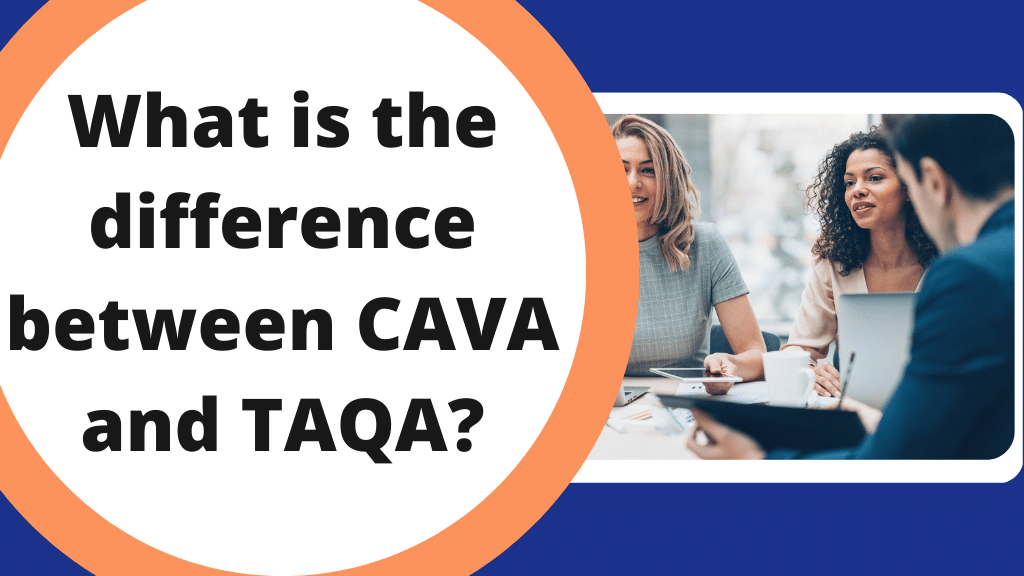March 28, 2023
What is the difference between CAVA and TAQA?

If you’re looking into education or training qualifications, you have probably come across the terms CAVA and TAQA. You might have noticed them in job adverts and specifications or heard other professionals saying things like “I’m on a CAVA course” or “He’s going to get his TAQA soon”.
And while we can understand why you might be wondering about the difference between CAVA and TAQA, it’s not a case of one versus the other when deciding on what qualification to take.
This is because CAVA is a qualification, whereas TAQA is a whole suite of qualifications.
The CAVA qualification is part of the TAQA suite, and TAQA itself is a whole group of essential qualifications for individuals involved with education, learning and helping others achieve.
To help you figure out all the jargon and decide which qualification you need, we’ve put together this blog post on the difference between CAVA and TAQA qualifications.
What does TAQA stand for?
TAQA stands for:
- Training
- Assessment
- Quality
- Assurance
We call this the TAQA suite because it is a suite of qualifications in the training, assessment and quality assurance fields.
Let’s look at these qualifications in more detail to highlight the difference between CAVA and TAQA and all the other qualifications within TAQA for you to consider.
TAQA Training Qualifications
Training qualifications within TAQA cover a broad range of teaching and training courses. This includes the Level 3 AET Award in Education and Training, which is a popular introductory course and ideal for anyone who wants to get into training.
It also includes the Level 5 DET Diploma in Education and Training, which is recognised as a full teacher training course and an alternative to university-based courses.
So, whether you’re looking to get your foot in the door to training or ready to make teaching your career, there’s a qualification here for you within the TAQA suite.
TAQA Assessment Qualifications
Assessor qualifications within TAQA consist of four separate qualifications for assessors; the CAVA qualification is the most comprehensive.
In explaining the difference between CAVA and TAQA, it’s important to understand the important role that CAVA plays within TAQA, but that it’s not of equal value.
CAVA Qualification
The CAVA qualification’s full title is the Level 3 Certificate in Assessing Vocational Achievement. However, the CAVA acronym is the most popular name by which it’s known.
As with many acronyms and brand names, sometimes they are used to describe things that are similar but not the same.
CAVA is often used to describe other assessing qualifications within the TAQA suite, including:
- Level 3 Award in Understanding the Principles and Practices of Assessment
- Level 3 Award in Assessing Competence in the Work Environment
- Level 3 Award in Assessing Vocationally Related Achievement
Sometimes people also use CAVA more broadly than this, using it for any assessment qualification, no matter its official title.
A1 Assessor Award
People might also refer to the previous generation of assessing qualifications that preceded CAVA and TAQA, such as A1 assessor training. The A1 assessor award has now been withdrawn. This doesn’t affect anyone with an existing assessor award, but for those looking for an assessor course, this course has been replaced.
One of the differences between these current and previous assessments is that there is now a mandatory knowledge unit in all of them. Within the TAQA suite of qualifications, the CAVA qualification and the previously mentioned level 3 qualifications above are the most suitable replacements.
To summarise, when you hear people talking about a CAVA course or qualification, clarifying which course they are referring to might be worthwhile!
TAQA Quality Assurance Qualifications
A high level of quality assurance is now required to get the most out of all qualifications, and it’s widely recognised that this brings various benefits, including:
• Improved learner experience
• Raised learner achievement rates
• Increased learner retention rates
• Helping to meet regulatory requirements
The qualifications within the TAQA suite for quality assurance fall into two main areas.
Internal Quality Assurance
Internal Quality Assurance, or IQA, is for professionals working within an organisation, such as training centres, colleges, schools, training departments and other places that deliver courses and qualifications.
If you are involved with (or want to get into) a career in internal quality assurance, you will find one of the following qualifications suitable for your needs;
- Level 4 Award in Understanding the Internal Quality Assurance of Assessment Processes and Practice
- Level 4 Award in the Internal Quality Assurance of Assessment Processes and Practice
- Level 4 Certificate in Leading the Internal Quality Assurance of Assessment Processes and Practice
External Quality Assurance
External Quality Assurance, or EQA, is for individuals who work at Awarding Bodies (such as City & Guilds) or as external consultants for training centres.
These are the folk who visit education and training centres to check on what is happening and ensure they comply with the requirements set by the Awarding Body. This role also involves supporting, advising and helping centres to improve should they need to.
If that sounds like the right career path for you, then you should consider taking one of these courses;
- Level 4 EQA Award in Understanding the External Quality Assurance of Assessment Processes and Practice
- Level 4 Award in External Quality Assurance of Assessment Processes and Practice
Completing the TAQA Suite of Qualifications
The three areas of training, assessment and quality assurance are related, so you will find that there is some integration between these qualifications. You will not be expected to repeat the units. So if you take a course which has units in common with one you have already completed, you will have less work required to complete the course for your next qualification.
For example, there is a unit which appears in both the Level 3 Award in Education and Training and all of the assessor qualifications within the TAQA suite. If you take the Level 3 AET and then take an assessor qualification after, you will not be expected to repeat that unit.
Common units also appear between the Level 4 Certificate in Education and Training, the Level 5 Diploma in Education and Training, CAVA assessor courses and the quality assurance courses listed above.
This means that work towards one qualification within the TAQA suite can count toward another. It also enables you to broaden your experience and enhance your career by covering two areas in one course of study.
At Carlton Training, we offer a wide range of TAQA qualifications across all four areas of the suite. If you are still unsure about the difference between CAVA and TAQA, or you would like more help and advice to decide which course is for you, don’t hesitate to call our team on 0800 688 9020 or find more contact information here.
Next ›‹ Previous
Back to Blog








